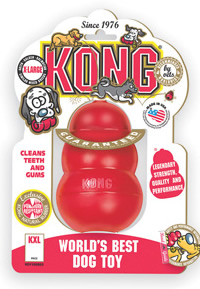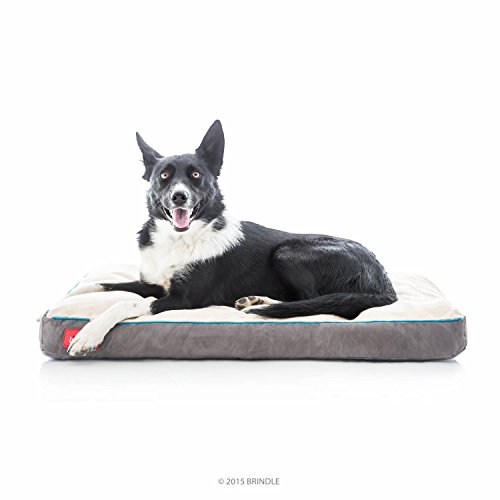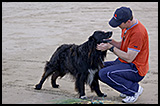
Starting your puppy on the road to a healthy life can be a confusing issue to navigate for the novice owner. You probably know that a trip to the vet is in order shortly after you bring home a puppy or dog, but do you know what to expect in that visit? There are a lot of terms thrown around that mean nothing to those of us without veterinary training. In this article, we’ll guide you through that first check-up (and the follow-up vaccinations), and hopefully assist you in making the best choices for your dog’s health.
The regimen of puppy care usually begins the first time you bring your pup to the vet (between 8 to 10 weeks of age). Your pup will have a full physical exam, de-worming and some initial vaccines. If your pup had his first vet visit before you brought him home, be sure to have those records on hand. You should also bring a stool sample in for examination. After this initial visit the vet will ask that you return to booster the vaccines until your puppy is a certain age. The time between boosters ranges from 2-4 weeks.
Rabies vaccines are usually the only ones required by law. It is given between 12 and 20 weeks of age depending on your vet. Due to some concern about over-stimulating the immune system, some clinics will have you come back to get your Rabies vaccine at a time when your pup needs no other vaccines. After the initial shot, boosters are required every 1-3 years, depending on the type of vaccine given.
The vaccine commonly known as Distemper is actually a collection of vaccines given in one shot. It’s technically called the DHPP vaccine: each letter stands for a virus or disease. In this shot, we have Distemper itself, Hepatitis, Parvovirus and Parainfluenza:
The first three vaccines in that group are core vaccines- they are recommended for all puppies and for dogs with an unknown vaccination history. Parainfluenza is non-core, but is always included in any combination distemper vaccine. Hence, that is the basic makeup of any combination ‘distemper’ shot. Some combination shots include other vaccines that are non-core, meaning they are only appropriate for dogs with more exposure. Those are:
The easy way to know what is included in a combination shot: look at the letters. If the shot is called DHLPP, it includes the Leptospirosis vaccine, and so on. Non-core vaccines are meant only for dogs at higher risk due to greater exposure. Ask your vet about all the options, and figure out what is best for your dog.
The Bordetella (kennel cough or canine cough) vaccine can be administered in 2 ways: a pair of vaccines given 3 weeks apart or by an intranasal (drops placed in the nose) vaccine. This vaccine is given to puppies and dogs that are exposed to other dogs in boarding, public dog park, training and other situations. The vaccine can be given to puppies over 8 weeks of age. Not all puppies require this vaccine- you and your veterinarian will determine if your puppy is at risk for this disease. Keep in mind that the Bordetella vaccine may NOT prevent your dog from getting kennel cough; as with Parainfluenza, it is only one of a number of viruses that cause kennel cough. However, it may lessen the severity if your pup is to come down with a case.
The Lyme Disease vaccine is quite controversial. It is recommended only for dogs in high-risk areas of the country. The vaccine has been known to cause reactions relating to the immune system, but depending on geography, the benefits may outweigh the risks. If you live in a high incidence area and choose not to vaccinate, be sure to ask your vet about a flea and tick prevention program.
De-worming and Flea/Tick/Heartworm Prevention:
The fecal examination will let your vet know if your pup has some type of worms. Most puppies are born with roundworms, and de-worming can start as early as 2 weeks with a breeder, shelter, etc. Your vet will most likely want to administer one de-worming medication at the first visit, and a second with the next round of boosters. After that, discuss and plan for flea/tick/heartworm prevention. There are a number of choices- discuss the options with your vet.
One other consideration in these initial visits is microchipping, which can be performed at the same time as any vaccinations. If you choose this, a microchip is inserted through a needle between the shoulder blades, and you’ll have some paperwork to fill out. Once complete, that microchip is linked a company database with your contact info, so anyone that scans it will be able to return your dog home safely.
This is a lot of information to absorb at once! Being prepared for the first vet visit you and your dog attend will make it a more relaxed experience for everyone. Stay positive with your dog, and future vet visits will be no big deal. Remember, ask questions about anything you are unsure of, and work with your vet to make the best choices for your dog.
 Choosing the best dog toys for your dog or puppy
Choosing the Best Dog Toys - Plus Our Favorites!
Choosing t
Choosing the best dog toys for your dog or puppy
Choosing the Best Dog Toys - Plus Our Favorites!
Choosing t
 Dogs :: Four Basic Commands That Your Dog Need to Learn (Page 1 of 2)
There are certainly lots of factors for proprietors to
Dogs :: Four Basic Commands That Your Dog Need to Learn (Page 1 of 2)
There are certainly lots of factors for proprietors to
 Memory Foam Pad for Dog Bed
Using a memory foam pad for
Memory Foam Pad for Dog Bed
Using a memory foam pad for
 An Introduction To Clicker Training For Dogs
How To Begin Clicker Trainin
An Introduction To Clicker Training For Dogs
How To Begin Clicker Trainin
 Basic Learning Theory and Dogs
Basic Learning Theory and Dogs
Basic Learning Theory and Dogs
Basic Learning Theory and Dogs
Copyright © 2005-2016 Pet Information All Rights Reserved
Contact us: www162date@outlook.com